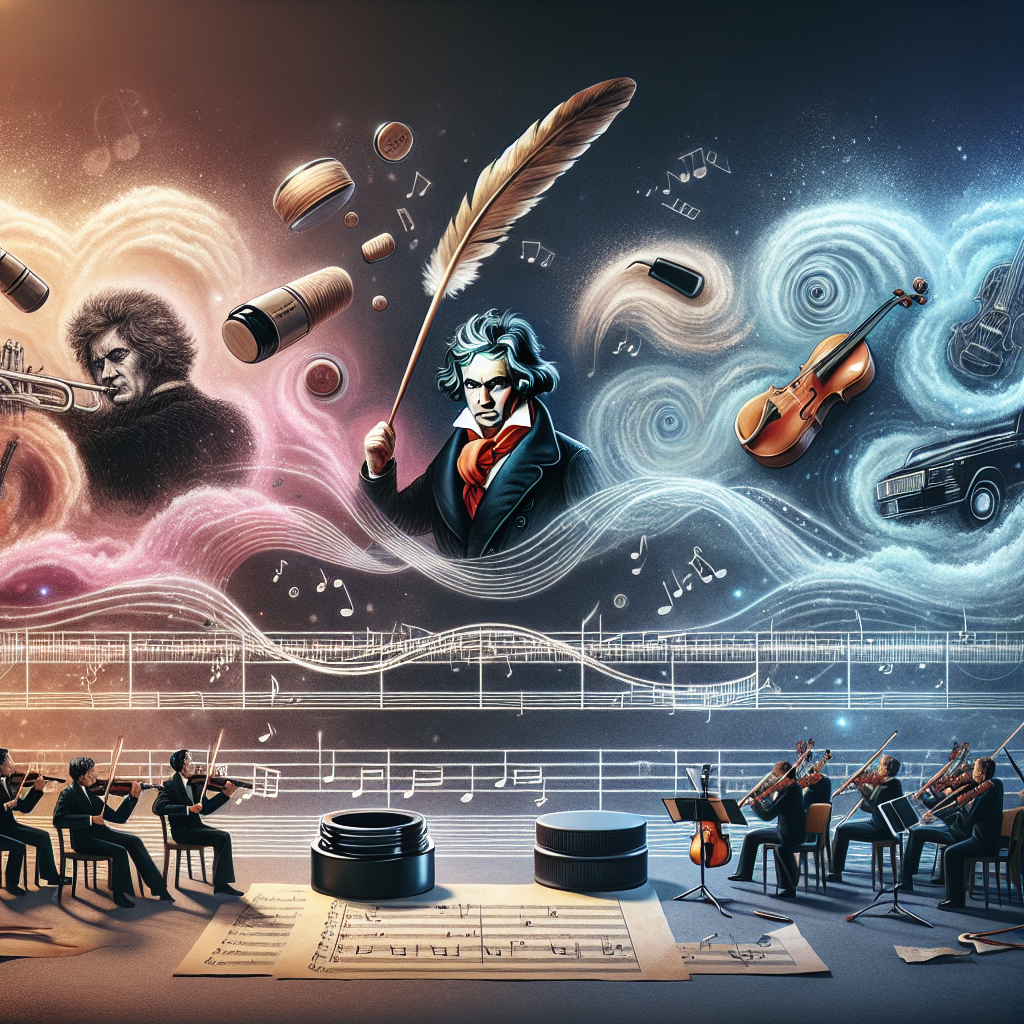
Beethoven’s Influence on the Development of the Symphony
Ludwig van Beethoven, born December 17, 1770, in Bonn, Germany, stands as a monolithic figure in the realm of Western classical music. His name evokes a sense of revolutionary change and undying human spirit. A prodigious composer, Beethoven’s body of work signifies the bridge between the Classical and Romantic eras in music. He remained relevant despite enduring personal tragedies, including his battle with deafness. This article delves into the life history of Beethoven along with an in-depth analysis of his gargantuan impact on music theory and composition, particularly focusing on his innovations in the symphony.
Endowed with unparalleled talent from a young age, Beethoven’s upbringing wasn’t an easy one. His father, Johann van Beethoven, recognized his son’s immense potential but adopted strict and often abusive methods to foster Ludwig’s musical talents. This difficult childhood added layers of depth and intensity to Beethoven’s works, shaping his unique perspective on music and life.
Beethoven’s Early Life and Musical Training
Beethoven’s formal music education began at age five under the vigorous tutelage of his father and later with several prominent teachers, most notably Christian Gottlob Neefe. By the age of 12, he had already published his first composition, showcasing early signs of his genius. His early works and education laid down the foundations that would define his later masterpieces.
Numerable opportunities came forth when Beethoven moved to Vienna at the age of 21, where he studied under Joseph Haydn and, briefly, Wolfgang Amadeus Mozart. Vienna, being the cultural heartbeat of Europe during that era, provided Beethoven a vast stage to present and develop his innovative compositions. His immersion in this rich musical environment allowed him to infuse traditional forms with unprecedented emotional depth and complexity.
Transforming the Classical Symphony
Beethoven’s symphonic output amplified the scope and emotional reach of the symphony, laying the groundwork for future Romantic composers. His nine symphonies expanded the form through deeper emotional narratives and complex structures. The Third Symphony, Eroica, marks a pivotal moment, often viewed as the inception of the Romantic era in music. Its colossal scale, emotional depth, and structural innovation were groundbreaking.
In Beethoven’s symphonies, one can see a symbiosis of thematic development, use of motifs, and a knack for dramatic contrasts. His Fifth Symphony, possibly his most famous, encapsulates the essence of his artistry. The iconic four-note motif transcends mere notes, serving instead as a groundbreaking thematic idea that runs throughout the entire work, pushing the boundaries of musical storytelling and sonata form.

Technical Innovations and Orchestration
Beethoven’s foray into compositions revealed his penchant for expanding the orchestra’s range. He was among the first to introduce trombones, piccolos, and contrabassoons in his Fifth Symphony. The sophistication with which he employed these instruments changed the texture and sonority of symphonic music, offering a new palette of colors for subsequent composers.
His Ninth Symphony shattered conventions once more by incorporating a full chorus and solo vocalists into the final movement, a unique innovation that elevated the emotional impact of the work. The “Ode to Joy” became symbolic not just of human joy but also of revolutionary ideas and humanist ideals. Beethoven’s orchestration techniques, innovative use of instrumental timbres, and dramatic flair provided a template to the Romantic composers who followed.
Modulation and Harmony
Modulation and harmonic progressions became essential tools in Beethoven’s compositional arsenal. Unlike his predecessors, who often adhered to established harmonic conventions, Beethoven embraced unexpected modulations and chromaticism to heighten emotional impact. His use of remote key relationships set a precedent for later composers.
A palpable example can be observed in his late piano sonatas and string quartets, such as Op. 131 in C# minor. These works are teeming with exploratory harmonic shifts and voice leading that defied conventional rules of harmony, providing listeners with an expansive emotional experience. Beethoven’s daring approach to harmony and modulation significantly influenced the harmonic language of the 19th and 20th centuries.
Psychological and Emotional Depth
Beethoven’s ability to convey psychological depth and emotional nuance in his music is perhaps his most enduring legacy. His compositions exhibit a profound capacity to communicate the human condition — its triumphant moments, its struggles, its sorrows, and its joys. He transformed music from an abstract form of entertainment to a profound medium for conveying complex emotional and psychological narratives.
His late string quartets stand as monumental achievements in this regard. These works, composed during his period of complete deafness, masterfully encapsulate a wide range of human emotions. His ability to craft intensely personal music in the face of his own adversity cements his status as one of the greatest composers of all time.
Legacy and Continuing Influence
Beethoven’s impact on symphonic composition and music theory is immeasurable. His progressive approaches to form, instrumentation, harmony, and emotional expression laid a foundation that generations of composers would build upon. Figures such as Brahms, Wagner, Mahler, and even 20th-century composers like Shostakovich and Stravinsky have drawn inspiration from Beethoven’s innovative work.
In educational contexts, Beethoven’s compositions are often studied meticulously for their technical brilliance and emotional depth. They serve as essential study material for understanding the transition from the Classical to the Romantic era and the evolution of Western music’s structural and expressive capabilities.
Conclusion
To sum up, Ludwig van Beethoven’s contributions to music theory and symphonic composition have resonated through the ages, altering the course of Western music. From his transformative approach to the symphony to his innovative techniques in orchestration, harmony, and emotional depth, Beethoven defied conventions and pushed the musical boundaries. His legacy continues to inspire and educate musicians and composers, ensuring that his monumental impact on music theory and composition remains indelible.
Beethoven’s life, marked by personal struggles and relentless creativity, stands as a testament to the power of human spirit and artistic expression. His music invites listeners not merely to enjoy but to contemplate and connect on a deeper level, proving that great art transcends time and personal tribulations. Through his revolutionary works, Beethoven created a musical language that continues to speak to the human soul.